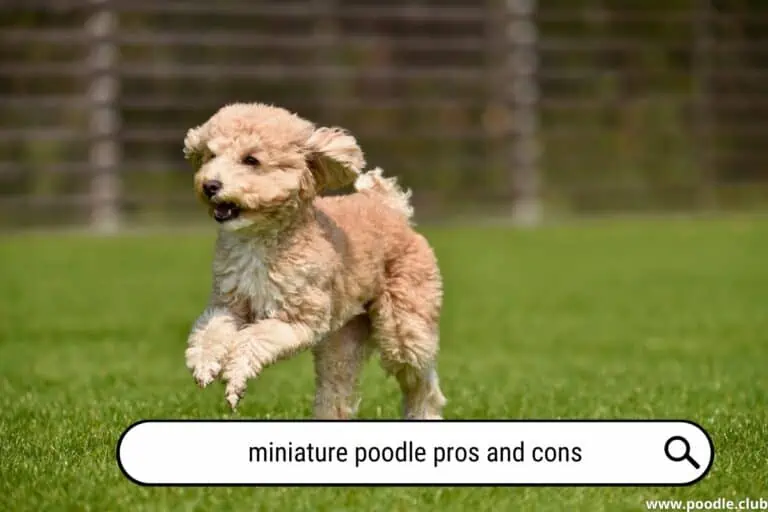How Long Do Teacup Poodles Live?
Teacup Poodles, despite their tiny size, can lead surprisingly long lives with the right care and attention. On average, a well-cared-for Teacup Poodle can live anywhere from 10 to 15 years.

Teacup Poodles’ lifespan largely depends on factors like genetics, diet, and overall care. Contrary to some beliefs, these petite pets can live significantly longer than the often-mentioned 5-year mark, given they are appropriately taken care of. Regular vet check-ups, a balanced diet, and regular exercise are essential to ensuring these tiny companions live a fulfilling and healthy life.
As always, every dog is an individual, and there can be variation in the lifespan of any breed. Still, knowing what to expect can help prospective and current owners provide the best care possible for their petite poodle. After all, while their size might be small, the love they bring is immense and timeless.
Teacup Poodle Overview
History and Origin
Teacup Poodles are a smaller variation of the well-known Toy Poodle breed. Originating from Germany, Poodles were initially used as hunting dogs, with their keen instincts and enthusiasm for water retrieval. Teacup Poodles, due to their size, have since transitioned from hunting companions to the ultimate lapdogs, lovingly embraced by aristocracy in the past and celebrities today.
Appearance and Size
The Teacup Poodle is the smallest of the Poodle breed variations, which also includes the Standard Poodle and Miniature Poodle. These tiny, delicate pups typically weigh between 2 to 4 pounds and stand around 8 to 10 inches in height – perfect for fitting into teacups or designer bags, hence their name!
Despite their petite stature, Teacup Poodles boast a bold, lively appearance. They have a well-defined, squarely-built body, long legs, and a distinctive curly coat. Their head is also proportionate to their size, with dark expressive eyes exuding a sense of intelligence and curiosity, and long floppy ears adding to their overall cuteness.
Coat and Colors
Beyond their size, Teacup Poodles are also known for their luxurious coats. Their hypoallergenic, curly fur is dense and textured, with less shedding than other breeds. Teacup Poodles can sport a variety of colors and patterns, ranging from solid blacks, whites, silvers, creams, and reds to more unique shades like apricot, blue, and even parti-colored (when two or more distinct colors appear simultaneously).
PuppySpot is a reputable dog marketplace where you can browse and find compatible puppies right from the comfort of your home. They have placed over 200,000 puppies into homes in the US!
Teacup Poodles’ coat colors can sometimes change as they age, adding an element of surprise to their appearance. Maintaining their coat requires regular grooming, including clipping or scissoring every 6 to 8 weeks. The famous “poodle cut” isn’t just a fashion statement but was initially designed to protect their joints from cold water while hunting.
In conclusion, Teacup Poodles are a captivating combination of tiny size, unique appearance, and low-shedding coats. As you invite them into your home, your heart will swell with love (although your grooming budget might follow suit!).
Temperament and Personality
Teacup poodles, although small in size, boast big personalities and temperaments that make them ideal pets for various lifestyles. Let’s delve into their intelligence, energy levels, and compatibility with family members.
Intelligence and Trainability
Teacup poodles are highly intelligent and relatively easy to train, thanks to their willingness to learn and adapt. As descendants of the intelligent poodle breed, these tiny canines can quickly pick up new tricks, excel in obedience training, and even participate in activities like agility. Did you know poodles are considered one of the smartest dog breeds? They’re basically like little furry Einsteins!
Despite their smarts, teacup poodles may occasionally exhibit some “small dog syndrome,” which means they might develop a Napoleon complex. To avoid this, be sure to provide consistent training and establish clear boundaries for your pint-sized pup.
Energy Levels and Exercise Requirements
You might be surprised to learn that these adorable furballs have a moderate to high energy level. They love to play and explore, requiring regular exercise to keep their minds stimulated and bodies fit. Physical activity could include:
- Short walks
- Indoor playtime
- Puzzle toys
- Agility training
While they may not need as much exercise as larger breeds, teacup poodles still need daily physical activity to stay happy and healthy. Don’t let their diminutive size fool you – they can be quite the athletes!
Socialization and Family Compatibility
Teacup poodles make excellent companions, especially for those who are looking for a small, loving, and sociable pet. They’re affectionate and loyal to their families, forming strong bonds with their owners. However, their tiny size makes them delicate and vulnerable to rough play, so they may not be the best choice for families with very young children.
It’s essential to socialize teacup poodles from a young age, as this will help prevent issues like separation anxiety and ensure they get along with other pets. Due to their intelligence and affectionate nature, teacup poodles can become fantastic therapy dogs as well.
Remember to keep an eye on your teacup poodle’s health, as they can be prone to conditions such as low blood sugar and infections. With proper care and love, these delightful pups can be a great addition to your family and brighten your life with their charming personalities.
Health and Lifespan
Common Health Issues
Teacup Poodles, despite their small stature and cute appearance, can face a variety of health issues. Some of the most common concerns in this breed include hypoglycemia, dysplasia, and progressive retinal atrophy.
- Hypoglycemia: Due to their tiny size, Teacup Poodles are prone to hypoglycemia, or low blood sugar. Feeding them small meals throughout the day can help maintain stable blood sugar levels.
- Dysplasia: These petite pooches might experience hip or elbow dysplasia, which can affect their mobility and cause discomfort. Regular check-ups and weight management can lessen the risk of this condition.
- Progressive Retinal Atrophy: This eye condition can lead to vision loss in Teacup Poodles. Early detection and treatment are crucial for managing this issue.
Remember, Teacup Poodles may be small, but they need big care and attention to ward off these health problems!
Lifespan
On average, Teacup Poodles have a life expectancy of around 12-15 years. This is quite impressive, considering some other dog breeds have shorter lifespans. These tiny pups may not be hunting with large packs like their standard Poodle cousins, but they’ll certainly be by your side for many wonderful years.
Contributing Factors
Several factors contribute to the health and lifespan of Teacup Poodles. Maintaining a healthy weight, staying vigilant for signs of infections, and regular veterinary checkups are vital in keeping your pint-sized pup in tip-top shape.
- Dental Disease: Teacup Poodles can be prone to dental issues due to their small mouths. Regular teeth cleaning is essential to prevent plaque buildup and infections.
- Collapsing Trachea: This is a condition where the trachea weakens, causing difficulty in breathing. Early diagnosis and treatment can help manage this problem.
- Heart Defects: Some Teacup Poodles may develop heart issues like mitral valve disease or other heart-related conditions. Regular checkups are vital to detect and treat these concerns early.
Of course, don’t forget the power of love and affection! A happy, well-cared-for Teacup Poodle typically enjoys a longer, healthier life. So give your tiny canine companion all the snuggles and attention they deserve.
Care and Grooming
Nutrition and Diet Needs
Teacup Poodles may be small in size, but they have big appetites! Providing them with the right balance of nutrients is essential for their health and longevity. A well-rounded diet for your tiny companion should include high-quality proteins, healthy fats, and limited carbohydrates. This means feeding them a diet specifically formulated for small dogs, with an appropriate amount of protein and fat, according to their age, weight, and activity level.
For example, a 5-pound Teacup Poodle might require about 250 calories per day. This could be achieved by offering them approximately 1/3 cup of dry food, twice a day. Remember, puppies will need more frequent feedings to ensure they are getting enough nutrition for growth spurts. Don’t forget to adjust their food portions as they grow!
Grooming Requirements
One of the many appeals of Teacup Poodles is their hypoallergenic coat, which is excellent for people with allergies. However, this curly fur does require regular grooming to keep them looking and feeling their best. Just like their larger counterparts, these tiny canines need consistent combing and brushing to avoid tangles and matting.
Additionally, Teacup Poodles should have a professional grooming session about once every six to eight weeks. This helps maintain their classic Poodle cut and style, which also prevents potential skin issues. Don’t forget the importance of regular teeth brushing and nail clipping, too – it’s all part of the pampering package for these pint-sized pets!
Exercise and Activity Needs
Despite their small size, Teacup Poodles are an energetic breed that requires daily exercise to stay happy and healthy. Incorporate regular walks and playtime into their routine, ensuring they are engaging in activities that are appropriate for their size. Keep in mind that these tiny dogs are prone to joint issues, so avoid excessive jumping or stair climbing.
Teacup Poodles make great companions for families, as they are social and adaptable. They enjoy interactive games, such as fetching a tiny ball or chasing after a toy. Additionally, enrolling them in doggy sports, like agility or obedience training, can help satisfy their active minds and bodies.
Just remember, always keep an eye on the calories and exercise routine so that your little furball stays in tip-top shape. After all, we want them to live a long, healthy, and fabulous life!
Breeding and Price
Breeding and Ethical Concerns
Teacup poodles, a term used to describe smaller-than-normal toy poodles, are a popular choice for people who want a tiny companion in their apartments. But breeding these cute “apartment dogs” comes with its ethical concerns. Since teacup poodles are not officially recognized by the American Kennel Club (AKC) or the Dog Registry of America, some breeders end up engaging in unethical practices. They may overbreed or inbreed the miniature poodles, possibly resulting in health issues and trauma.
You might think, “I’ll just adopt a teacup poodle puppy from Germany or France!” However, regardless of the country, it’s crucial to research breeders and the conditions they keep their dogs in before purchasing. No one wants to support harmful practices, right?
Price and Factors Affecting Cost
Now that we’ve covered the ethical concerns, let’s talk about the price of teacup poodles. One thing’s for sure: they don’t come cheap! The purebred teacup poodle’s price can range from $1,200 to over $5,000, depending on various factors. Some of these factors include:
- Breeder reputation: Reputable breeders who follow ethical practices and have high-quality dogs will generally charge more. But you get what you pay for, including in this case, a healthier poodle.
- Location: The cost of living and transportation involved can affect the overall price of your furry friend.
- Pedigree: If the teacup poodle comes from a long line of champions or is directly related to certain pedigreed dogs, the price may skyrocket.
Sure, teacup poodles are expensive, but that should not prevent you from researching breeders and ensuring that you’re making an ethically-sound decision. Remember, you want your tiny canine companion to be healthy and happy while keeping your conscience clear.





![Do Poodles Need Haircuts? [The TRUTH]](https://poodle.club/wp-content/uploads/2022/12/do-poodles-need-haircurs-768x512.webp)

![Do Poodles Come in Merle [Risks]](https://poodle.club/wp-content/uploads/2023/05/do-poodles-come-in-merle-768x512.webp)